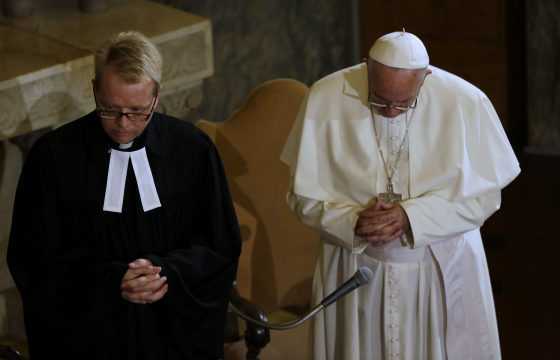Has Pope Francis just opened a door for non-Catholics to receive communion?
Christopher Lamb in Rome- The Tablet - Fri, Nov 20th 2015
In 1996 the late Cardinal Basil Hume wrote to Tony Blair, then an Anglican and on the verge of becoming Prime Minister, asking him to refrain from taking communion when he attended Mass with his family.
Blair, married to a Catholic, reluctantly agreed but in his letter of reply to the cardinal wrote: “I wonder what Jesus would have made of it.”
He was highlighting the sadness that many Christians married to Catholics feel that, despite being joined in the sacrament of matrimony, they cannot share in the sacrament of the eucharist with their spouses (except in particular circumstances.)
On Sunday a Lutheran woman in this situation addressed a question to Pope Francis when he visited the Lutheran Church on Rome on Sunday.
“We have lived together for many years, sharing joys and pains,” she said. “And therefore it hurts us very much being divided in the faith and not being able to participate together at the Lord’s Supper. What can we do to reach, finally, communion on this point?”
As we might have expected the Pope did not say “yes, go ahead” but neither did he shut down the question either. It was rather like the synod on the family’s treatment of whether divorced and remarried Catholics can receive communion: a door has been opened.
In his response Francis on the one hand stressed he would “never dare give permission” but then said it is up to individual consciences to decide.
“It’s true that in a certain sense, to share means that there aren’t differences between us, that we have the same doctrine – underscoring that word, a difficult word to understand.
"But I ask myself: but don’t we have the same Baptism? If we have the same Baptism, shouldn’t we be walking together? And you’re a witness of a likewise profound journey, a journey of marriage: itself a journey of family and human love and of a shared faith, no?
"We have the same Baptism.”
He went on: “The supper? There are questions that only if one is sincere with oneself and the little theological light one has, must be responded to on one’s own. See for yourself. This is my body. This is my blood. Do it in remembrance of me – this is a viaticum that helps us to journey on.
Finally, the Pope added: “I can only respond to your question with a question: what can I do with my husband that the Lord’s Supper might accompany me on my path? It’s a problem to which everyone must respond,” he said. “a pastor-friend once told me that ‘We believe that the Lord is present there, he is present’ – you believe that the Lord is present. And what's the difference? There are explanations, interpretations, but life is bigger than explanations and interpretations.”

Pope Francis, right, prays with Rev Jens-Martin Kruse during a visit to the Lutheran church, in Rome, on Sunday
It should be pointed out that there are times when non-Catholic Christians can receive communion in the Catholic Church. The 1993 ecumenical directory issued by the Vatican said it was possible for other Christians to receive the sacraments in “situations of grave and pressing need” at the discretion of the priest and according to norms of the local bishops’ conference.
The 1998 document by the Bishops of England and Wales, One Bread One Body, identified occasions of “joy and sorrow” when exceptions might be made such as a funeral or first Holy Communion. It is also the norm that Christians from other denominations marrying Catholics receive communion during their wedding nuptial mass.
There are, however, moves to a more general permission.
The working document for last month’s synod on the family said this should be possible whenever the pastor for the non-Catholic is not available.
But during the gathering the Archbishop of Birmingham, Bernard Longley, co-Chairman of the Anglican-Roman Catholic International Commission (Arcic), issued a statement ruling this out.
He said this would “establish a category of Christians not in full communion with the Catholic Church yet distinguished from other Christians by a ‘right’ to receive Holy Communion at a Roman Catholic Mass on any occasion.”
Archbishop Longley, however, is a pastorally sensitive man who said he hoped that the current exceptions that allow non-Catholics to receive the sacraments become better known. He has also hinted in the past that greater exceptions might be made.
In an interview with the Church of Ireland Gazette in 2013 the archbishop said he “could imagine and foresee one of the fruits of our ecumenical engagement as moving towards a deeper understanding of communion and a deeper sharing between our churches.”
And with Pope Francis, this looks more possible than ever before
share :
Related:
- Anglican leader to Pray with Pope on Saturday
- Anglican leader to Pray with Pope on Saturday
- Reasons I’m a Better Christian as a Catholic
- Important Orthodox Church gathering difficulties
- Francis and Ecumenical Patriarch Bartholomew I embraced one another
- A Breakthrough in Christian/Jewish Relations
- Theologian says China to have largest Christian population
- A Breakthrough in Christian/Jewish Relations
- Important Orthodox Church gathering difficulties
- Francis and the Evangelicals


 Votes : 0
Votes : 0









